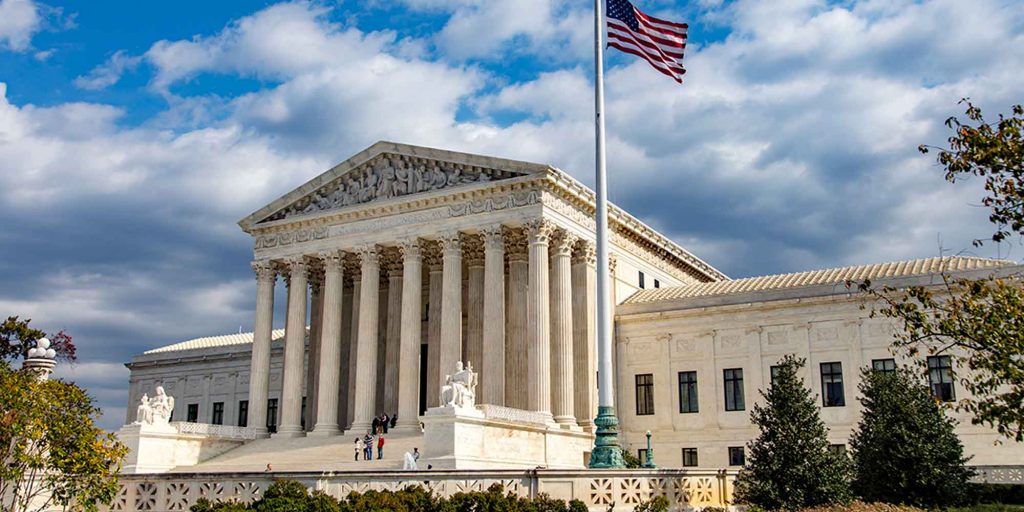A case recently came out of the Supreme Court in which ruled against an Alaska man who argued police retaliated against him for exercising free speech. It has been three cases and nearly a decade in the making but the Supreme Court has finally ruled in Nieves v. Bartlett that the existence of probable cause defeats a First Amendment retaliatory arrest case…with one, small caveat. The State and Local Legal Center (SLLC) filed an amicus brief in favor of the broader ruling in this case.
Facts
Respondent Russell Bartlett was arrested by police officers Luis Nieves and Bryce Weight for disorderly conduct and resisting arrest in a remote part of Alaska. According to Sergeant Nieves, he was speaking with a group of attendees when a seemingly intoxicated Bartlett started shouting at them not to talk to the police. When Nieves approached him, Bartlett began yelling at the officer to leave. Rather than escalate the situation, Nieves left. Bartlett disputes that account, claiming that he was not drunk at that time and did not yell at Nieves. Minutes later, Trooper Weight says, Bartlett approached him in an aggressive manner while he was questioning a minor, stood between Weight and the teenager, and yelled with slurred speech that Weight should not speak with the minor. When Bartlett stepped toward Weight, the officer pushed him back. Nieves saw the confrontation and initiated an arrest. When Bartlett was slow to comply, the officers forced him to the ground. Bartlett denies being aggressive and claims that he was slow to comply because of a back injury. After he was handcuffed, Bartlett claims that Nieves said “bet you wish you would have talked to me now.”
Bartlett sued under 42 U. S. C. §1983, claiming that the officers violated his First Amendment rights by arresting him in retaliation for his speech—i.e., his initial refusal to speak with Nieves and his intervention in Weight’s discussion with the minor.
Court Findings
While police officer Luis Nieves and Russell Bartlett have different versions of what happened at that night, even the Ninth Circuit agreed that Sergeant Nieves had probable cause to arrest Bartlett. Sergeant Nieves knew Bartlett had been drinking and talking loudly when he saw Bartlett stand close to another officer and the officer push Bartlett away. But Bartlett claimed Sergeant Nieves really arrested him in violation of his First Amendment free speech rights because he had refused to speak to Sergeant Nieves previously, which Bartlett reminded Sergeant Nieves of when he was being arrested.
The Ninth Circuit held that Bartlett could bring a First Amendment retaliatory arrest case even though there was probable cause to arrest him because a retaliatory arrest would “chill a person of ordinary firmness from future First Amendment activity” and “Bartlett had presented enough evidence that his speech was a but-for cause of the arrest.”
The Supreme Court disagreed 6-3 holding that probable cause generally defeats a retaliatory arrest claim. Chief Justice Roberts, writing for the majority, relied primarily on Hartman v. Moore (2006), where the Court held that probable cause defeats retaliatory prosecution claims. In Hartman, the Court noted that proving causation is difficult in retaliatory prosecution cases because “the official with the malicious motive does not carry out the retaliatory action himself—the decision to bring charges is instead made by a prosecutor, who is generally immune from suit and whose decisions receive a presumption of regularity.”
Similarly, it is difficult to determine if protected speech is the cause of an arrest because “protected speech is often a ‘wholly legitimate consideration’ for officers when deciding whether to make an arrest. Officers frequently must make ‘split-second judgments’ when deciding whether to arrest, and the content and manner of a suspect’s speech may convey vital information—for example, if he is ‘ready to cooperate’ or rather ‘present[s] a continuing threat.’ If probable cause doesn’t defeat a First Amendment retaliatory arrest claim “[a]ny inartful turn of phrase or perceived slight during a legitimate arrest could land an officer in years of litigation.”
The Court’s caveat is the “no-probable cause requirement should not apply when a plaintiff presents objective evidence that he was arrested when otherwise similarly situated individuals not engaged in the same sort of protected speech had not been.” An example Chief Justice Roberts offers is a person complaining about police misconduct being arrested for jaywalking. Police officers typically “exercise their discretion” and don’t arrest people for very minor crimes like jaywalking. While Justices Breyer, Alito, Kagan, and Kavanaugh, agreed with this “narrow qualification,” Justice Thomas, who otherwise joined the majority opinion, did not.
